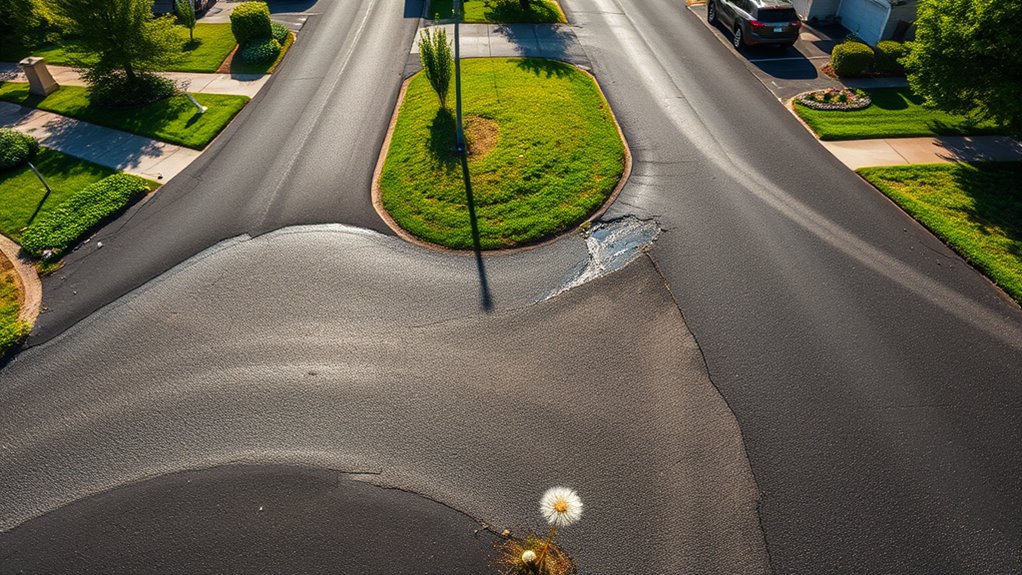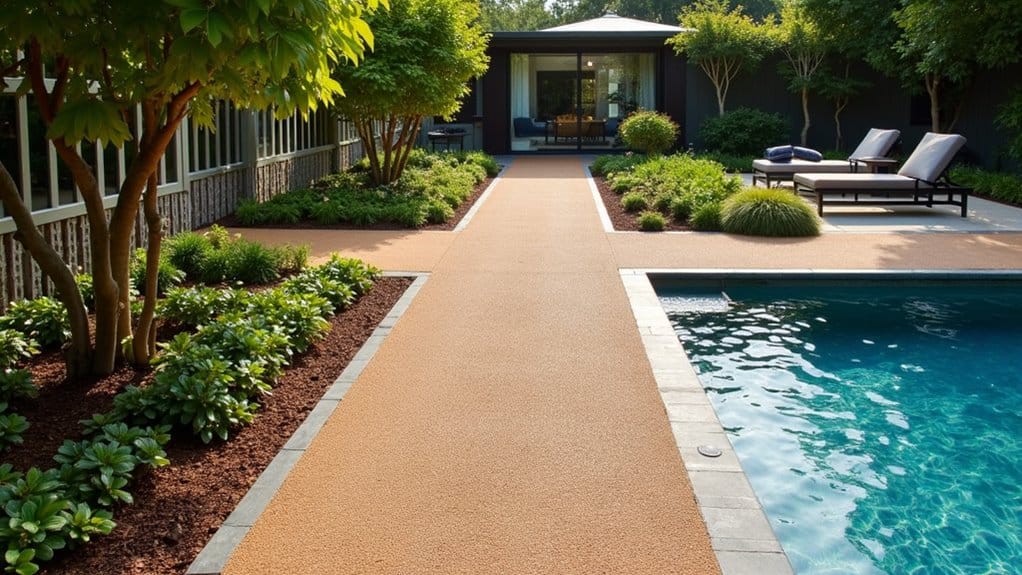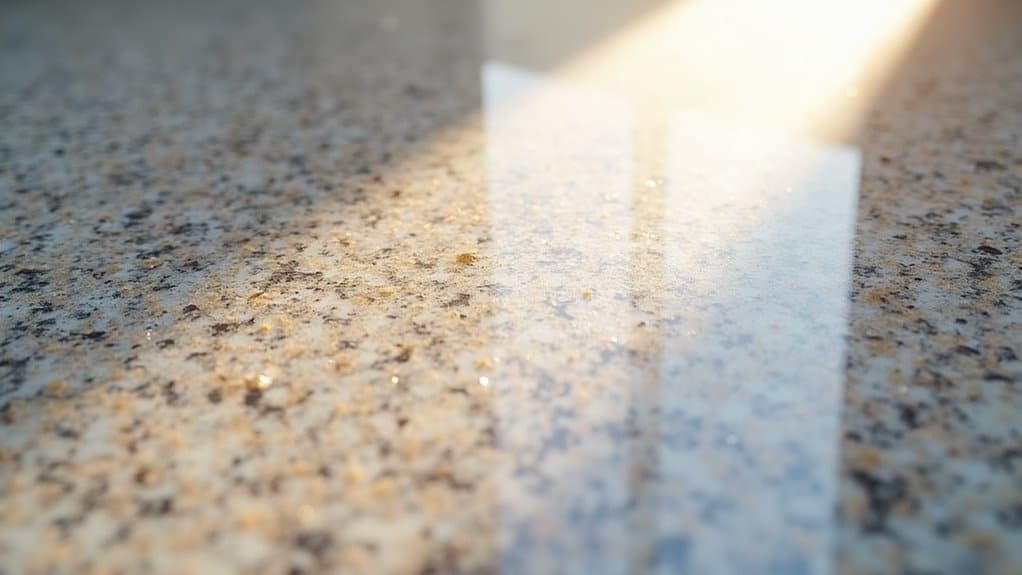Tarmac driveways aren't the most eco-friendly option. They require a lot of resources and energy to produce, which contributes to greenhouse gas emissions. Additionally, tarmac is impermeable, disrupting local habitats and increasing water runoff, leading to potential pollution in streams and rivers. While there are more sustainable alternatives available, the production of tarmac still raises environmental concerns. However, there are ongoing developments aimed at improving sustainability in this area. If you're interested in exploring greener options and future innovations, there's plenty to learn.
Table of Contents
ToggleKey Takeaways
The production of tarmac raises concerns due to resource depletion, high energy use, and significant greenhouse gas emissions. This has a negative impact on the environment.
Tarmac driveways are impervious, which leads to increased water runoff. This runoff can pollute local waterways and harm nearby ecosystems.
Moreover, the need for frequent repairs to tarmac driveways consumes additional resources and generates waste, undermining sustainability efforts.
There are eco-friendly alternatives available, such as permeable pavers and grass-reinforced surfaces, which provide better drainage and support sustainable practices.
However, innovations in tarmac production, like warm mix asphalt and electric plant technology, are being developed to help reduce its environmental footprint.
Understanding Resource Depletion and Energy Consumption
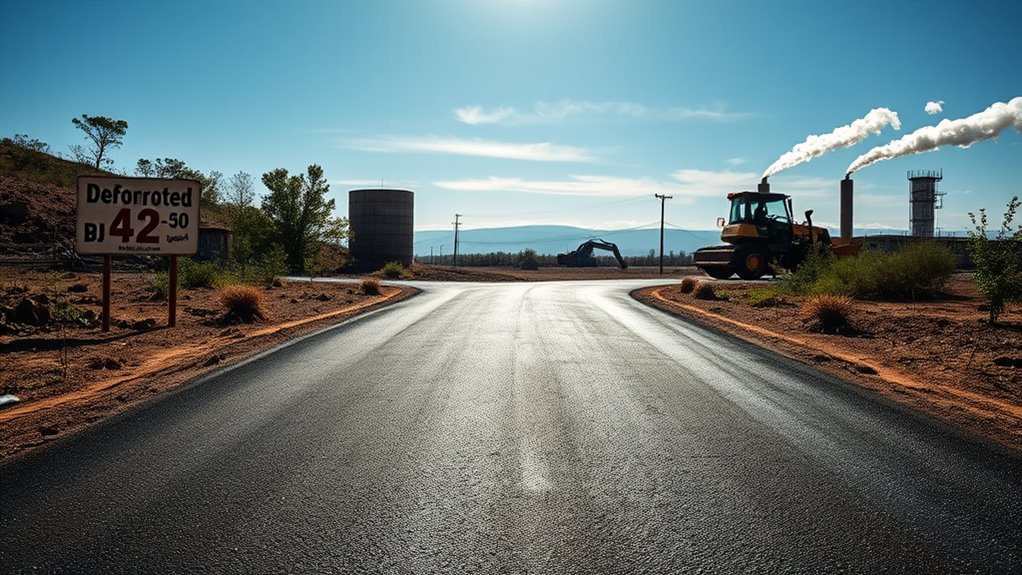
While tarmac driveways may not be the first thing that comes to mind regarding environmental impact, their production involves significant resource depletion and energy consumption. Tarmac relies heavily on fossil fuels, leading to greenhouse gas emissions.
Fortunately, modern manufacturing facilities are becoming more energy-efficient by using advanced processes that cut energy use. Greenhouse gas emissions from production have significantly decreased due to these advancements.
Recycling asphalt is vital for conserving resources, as it reduces the need for energy-intensive raw materials. By reusing existing materials, we not only lower energy demands but also minimise waste in landfills.
Ongoing research into sustainable materials is promising, aiming to improve energy efficiency and lessen reliance on new resources. This highlights a positive direction for more sustainable tarmac production in the UK.
The Environmental Challenges of Tarmac Driveways
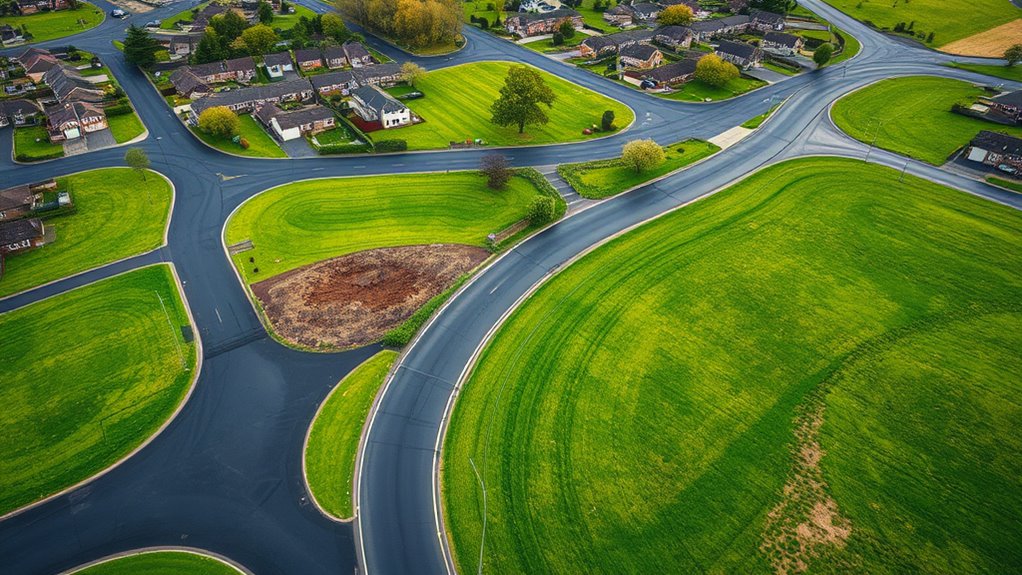
Tarmac driveways pose several environmental challenges that often go overlooked. The production and installation of tarmac can disrupt local habitats, as extracting materials damages ecosystems. Being impervious, tarmac increases water runoff, which allows pollutants to flow into rivers and streams, harming aquatic life. Furthermore, tarmac's ability to absorb heat contributes to urban heat islands, raising local temperatures and energy demands. Additionally, eco-friendly tarmac options can help mitigate some of these environmental impacts by promoting sustainable practices. Considering that tarmac typically lasts 10-15 years, its frequent need for repairs can lead to increased resource consumption and waste generation.
| Environmental Challenge | Impact |
|---|---|
| Habitat Disruption | Land clearing affects local wildlife |
| Water Runoff | Pollutants contaminate waterways |
| Energy Consumption | Increased cooling costs |
| Land Use Impact | Damage from raw material extraction |
| Pollution Risks | Concerns over chemical contamination |
Addressing these issues is crucial for fostering sustainable practices in driveway installation.
Exploring Eco-Friendly Alternatives
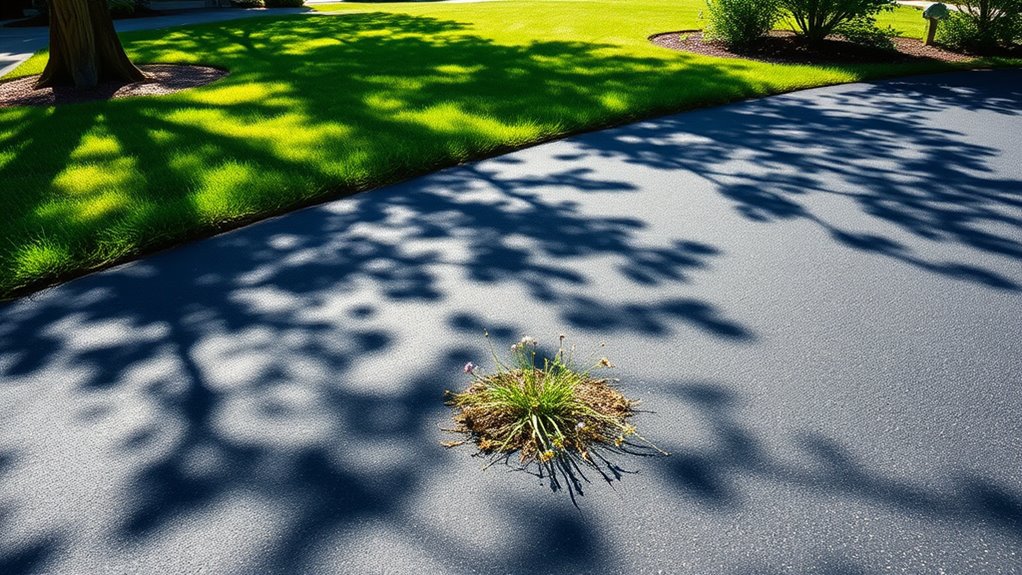
Finding eco-friendly alternatives to tarmac driveways is increasingly important as awareness of their environmental impact rises.
Crushed concrete is a great option, as it uses recycled materials and improves water filtration. Natural stone pavers are another excellent choice; they emit no carbon and allow water to drain through the gaps, aiding natural drainage. Additionally, permeable pavers enable water to pass through, reducing surface runoff and enhancing soil moisture. Using resin bound surfaces is also an innovative alternative that is both environmentally friendly and compliant with sustainable drainage regulations.
Porous concrete mimics natural water cycles, reducing runoff, while grass-reinforced driveways offer a stable and attractive surface that supports sustainable drainage.
Additionally, using recycled materials or local gravel not only cuts down on waste but also lowers transport costs.
Sustainability Measures in Tarmac Production
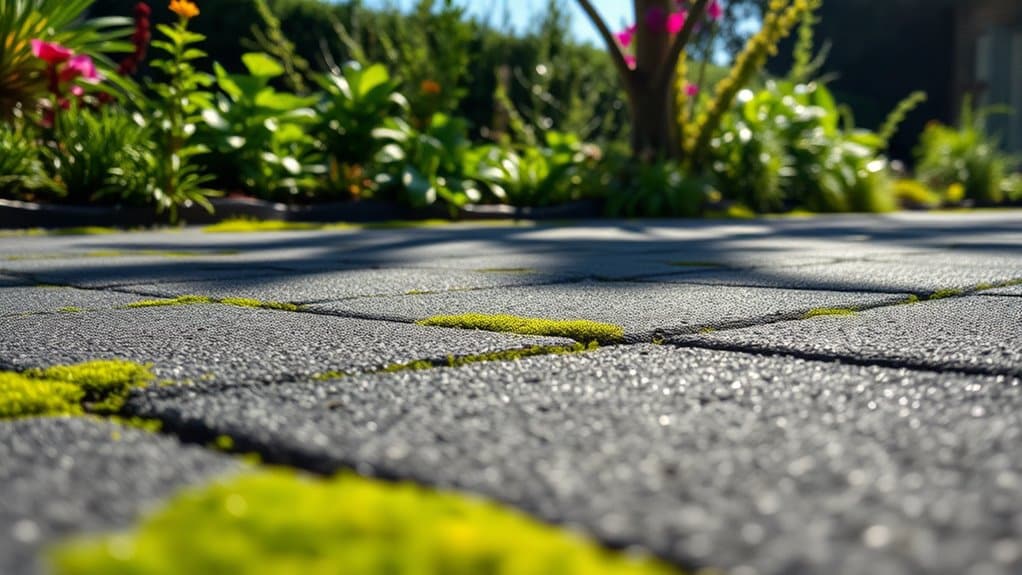
As the construction industry places a greater emphasis on sustainability, tarmac production has significantly adapted to meet environmental challenges.
The use of lower carbon materials, such as biogenic asphalts, can reduce carbon footprints by as much as 40%. Warm mix asphalt has become standard for many projects, helping to achieve net-zero targets.
Furthermore, incorporating recycled asphalt materials, like reclaimed asphalt planings (RAP), significantly cuts down on waste and boosts sustainability.
Innovations such as electric plant technology and renewable fuels also help to lower emissions.
Future Innovations for a Greener Tomorrow
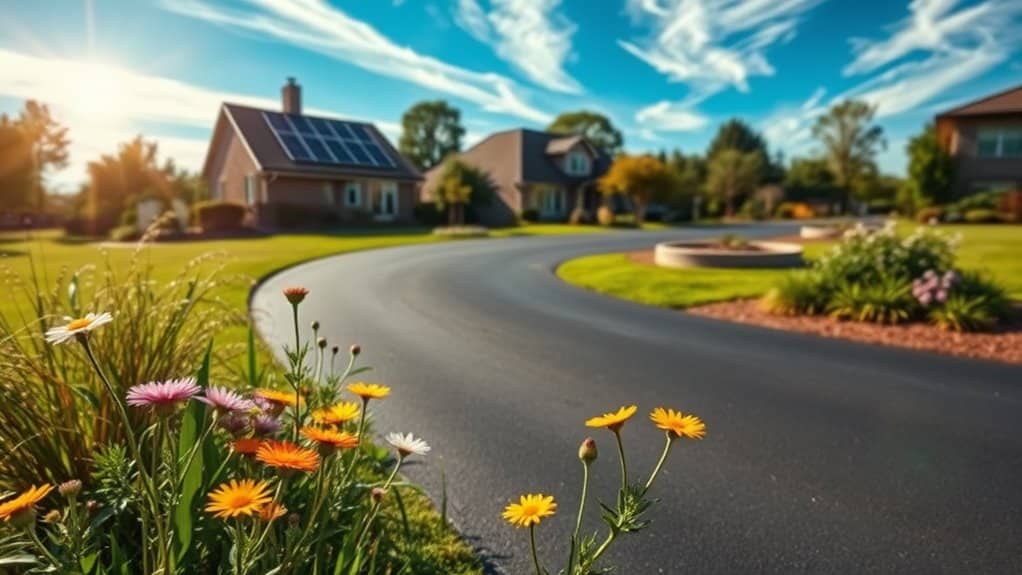
Traditional driveway materials have long been the norm, but there's a growing shift towards eco-friendly solutions that promise a greener future. Recycled materials are now integral to modern driveway construction, helping to cut down on waste and conserve resources.
Take porous asphalt, for instance; it allows water to drain through, reducing surface runoff and aiding groundwater replenishment.
Then there are composite pavers made from recycled plastics and grass pavers that encourage biodiversity. Permeable concrete is also gaining traction as a sustainable alternative to conventional asphalt. Additionally, resin-bound driveways are becoming popular for their durability and ability to recharge groundwater supplies, further promoting conservation.
Frequently Asked Questions
How Long Does a Tarmac Driveway Typically Last?
A tarmac driveway usually lasts between 15 to 20 years, influenced by factors such as the quality of installation and ongoing maintenance. To extend its lifespan, ensure proper care and be mindful of how it's used; for example, heavy vehicles or frequent parking in the same spot can wear it down faster.
Can Tarmac Driveways Be Recycled After Removal?
Yes, tarmac driveways can be recycled after removal, making tarmac recycling an environmentally friendly option. This process helps conserve resources and reduces waste sent to landfill, showcasing a sustainable way to handle asphalt materials effectively. For instance, recycled tarmac can be used in new road construction or as a base for new driveways, benefiting both the environment and the community.
What Maintenance Is Required for Tarmac Driveways?
To keep your tarmac driveway in good condition, focus on regular cleaning, seal it every few years, and fix any surface damage as soon as you notice it. This simple maintenance routine will help prolong its life, keep it safe, and prevent costly repairs, all while improving its appearance. For instance, sweeping away leaves and debris can prevent staining, and sealing protects against weather damage.
Are There Specific Regulations for Tarmac Installation?
Yes, there are specific regulations and guidelines for tarmac installation in the UK. You need to obtain local permits, follow environmental standards, and comply with national building codes. For instance, if you're installing a driveway, it's essential to ensure proper drainage to prevent flooding and minimise environmental impact. Always check with your local council for specific requirements before starting your project.
Do Tarmac Driveways Affect Property Value?
Tarmac driveways significantly improve a property's appeal with their tidy look. Their consistent appearance not only enhances curb appeal but also raises the perceived value, making homes with tarmac more appealing to potential buyers in the UK property market. For example, a well-maintained tarmac driveway can make a house stand out in a street of older or less attractive driveways, potentially leading to quicker sales and better offers.
Conclusion
When assessing the environmental impact of tarmac driveways, it's evident that they provide certain benefits, but their eco-friendliness is debatable. While they're durable and require minimal maintenance, the production of tarmac involves resource depletion and high energy use.
Looking at greener alternatives, such as permeable paving or gravel, can help reduce these environmental concerns. By making informed choices about driveway materials, you can demonstrate a commitment to sustainability and potentially inspire positive change within your community.
Prepare the perfect base for your resin bound stone installation and discover the crucial factors that ensure lasting durability.
Know where resin bound surfacing can transform spaces for both residential and commercial use, and discover the countless benefits that Read more
A stone carpet combines beauty and resilience in flooring, but what makes quartz floors uniquely beneficial? Discover the secrets behind Read more

